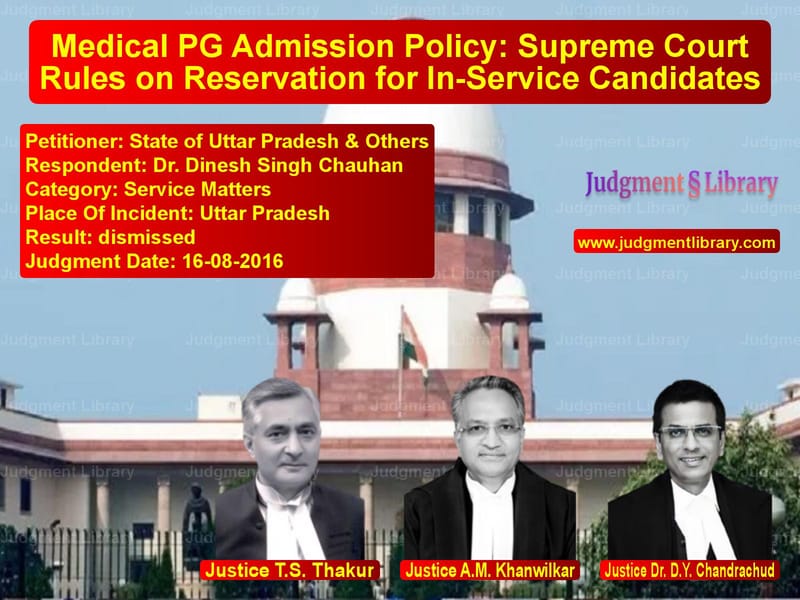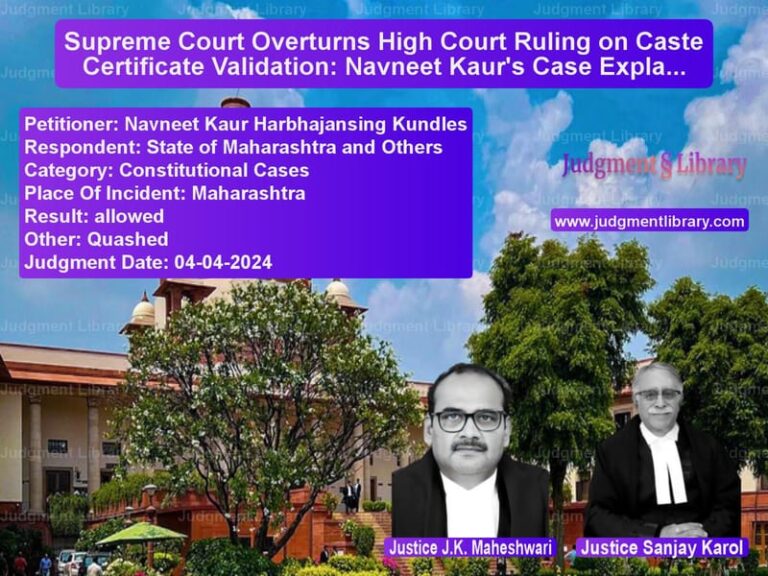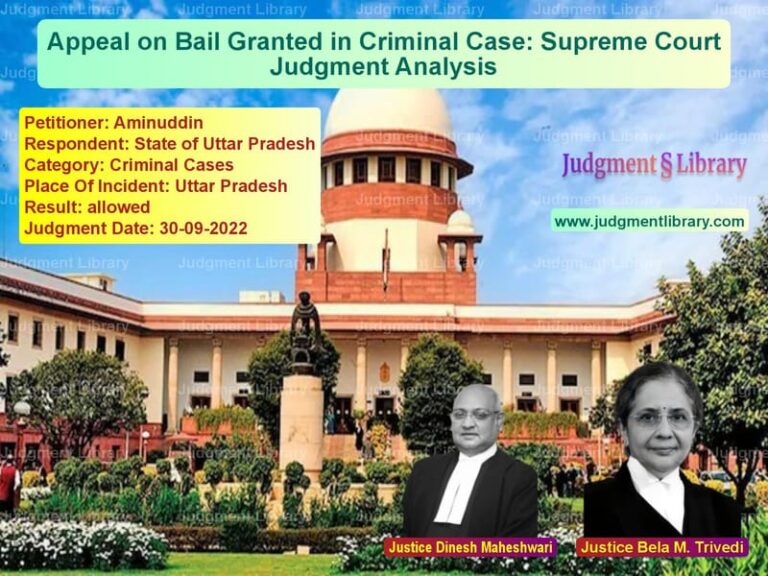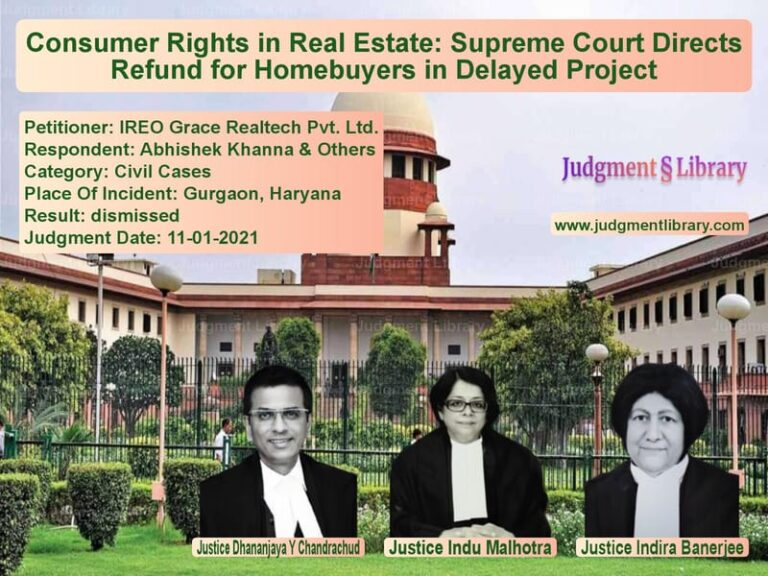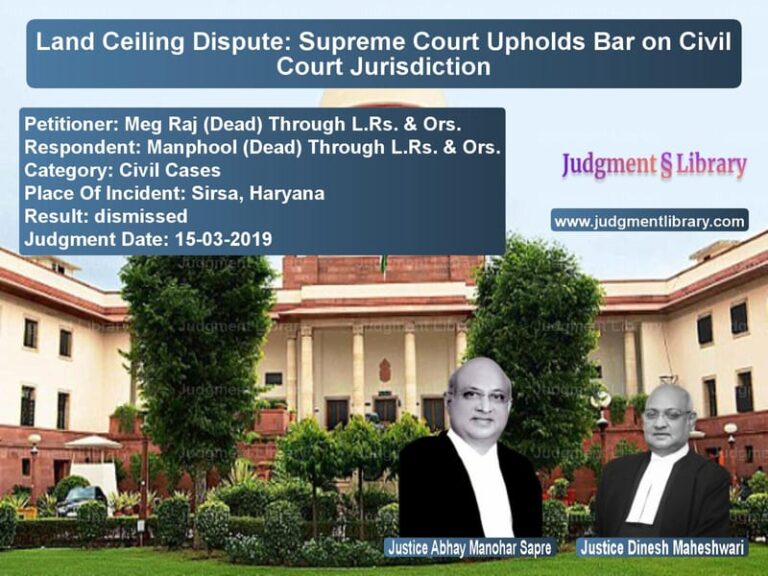Medical PG Admission Policy: Supreme Court Rules on Reservation for In-Service Candidates
The Supreme Court of India, in the case of State of U.P. & Ors. vs. Dr. Dinesh Singh Chauhan, addressed a significant issue regarding the eligibility of in-service medical officers for reserved postgraduate medical seats. The case revolved around the validity of state policies that provided a 30% reservation for in-service medical officers in postgraduate medical education and whether such a reservation was permissible under the regulations framed by the Medical Council of India (MCI).
Background of the Case
The case originated from a series of petitions filed by in-service medical officers from Uttar Pradesh, challenging government orders that required three years of service in remote or difficult areas to qualify for the reserved 30% quota in postgraduate medical courses. The petitioners argued that this condition was ultra vires and violated Articles 14, 15, and 16 of the Constitution of India.
The High Court of Allahabad ruled that the state government had no authority to frame rules that contravened the regulations laid down by the Medical Council of India. The court held that the MCI’s Regulation 9 did not permit any reservation for in-service candidates in postgraduate medical degree courses, except for a weightage system that provided additional marks for service in remote areas. The state of Uttar Pradesh challenged this ruling before the Supreme Court.
Arguments of the Petitioner (State of U.P.)
The state of Uttar Pradesh, through its legal representatives, presented the following arguments:
- The government had the authority to frame policies that encouraged doctors to serve in rural and difficult areas by providing a 30% reservation for in-service candidates in PG degree courses.
- The policy was in line with public interest and aimed at addressing the severe shortage of doctors in rural areas.
- The MCI’s regulations should not override the power of the state government to make special provisions for in-service candidates.
- Doctors who had served in remote areas deserved a preferential opportunity to specialize in postgraduate medical education.
Arguments of the Respondent (Dr. Dinesh Singh Chauhan and Others)
The respondents, represented by their legal counsel, argued:
- The MCI’s Regulation 9 provided only for additional weightage marks as an incentive for doctors serving in remote areas but did not allow a separate reservation for in-service candidates in PG degree courses.
- The state’s policy was contrary to the central regulations and thus unconstitutional.
- Admission to postgraduate medical degree courses should be strictly based on merit, determined by the National Eligibility-cum-Entrance Test (NEET).
- Reserving seats exclusively for in-service candidates would be unfair to general category aspirants who scored higher in the entrance examination.
Supreme Court’s Judgment
The Supreme Court, in a detailed judgment delivered by Chief Justice T.S. Thakur, Justice A.M. Khanwilkar, and Justice Dr. D.Y. Chandrachud, ruled in favor of the respondents. The key findings were:
- The MCI’s Regulation 9 was a complete code for the admission process to postgraduate medical courses, and states could not introduce additional reservations that were not provided for in these regulations.
- While states had the authority to frame policies, such policies could not override central regulations governing medical education.
- The provision allowing additional weightage marks for in-service candidates who worked in remote areas was a valid incentive, but separate reservation was not permissible.
- The government order providing 30% reservation for in-service candidates was unconstitutional and void.
- Admission to postgraduate medical degree courses must be conducted strictly based on merit, as determined by the NEET examination.
Impact of the Judgment
1. Strict Enforcement of MCI Regulations
The judgment reaffirmed that the regulations laid down by the Medical Council of India must be followed strictly and cannot be altered by state governments. This ensures uniformity and merit-based selection in postgraduate medical admissions.
2. No State-Level Reservations for PG Degree Courses
The ruling clarifies that while states can provide incentives to in-service doctors through weightage marks, they cannot reserve seats for them in postgraduate degree courses. This ensures that all candidates compete on a level playing field.
3. Merit-Based Admission Process
The judgment strengthens the merit-based approach to medical admissions by upholding the principle that postgraduate medical education should be awarded based on NEET scores, with limited incentives for rural service.
4. Incentivizing Rural Medical Service
The court recognized the importance of encouraging doctors to serve in rural areas. However, instead of reservations, it upheld the provision allowing additional marks for doctors serving in remote locations.
Conclusion
The Supreme Court’s judgment in State of U.P. & Ors. vs. Dr. Dinesh Singh Chauhan is a landmark decision that upholds the integrity of medical education regulations while ensuring that incentives for rural service do not undermine the merit-based admission process. The ruling provides clarity on the limits of state authority in framing policies that contradict national regulations, reinforcing the supremacy of MCI guidelines in postgraduate medical admissions.
Don’t miss out on the full details! Download the complete judgment in PDF format below and gain valuable insights instantly!
Download Judgment: State of Uttar Prade vs Dr. Dinesh Singh Cha Supreme Court of India Judgment Dated 16-08-2016-1741878517027.pdf
Direct Downlaod Judgment: Direct downlaod this Judgment
See all petitions in Recruitment Policies
See all petitions in Public Sector Employees
See all petitions in Promotion Cases
See all petitions in Judgment by T.S. Thakur
See all petitions in Judgment by A M Khanwilkar
See all petitions in Judgment by Dhananjaya Y Chandrachud
See all petitions in dismissed
See all petitions in supreme court of India judgments August 2016
See all petitions in 2016 judgments
See all posts in Service Matters Category
See all allowed petitions in Service Matters Category
See all Dismissed petitions in Service Matters Category
See all partially allowed petitions in Service Matters Category

